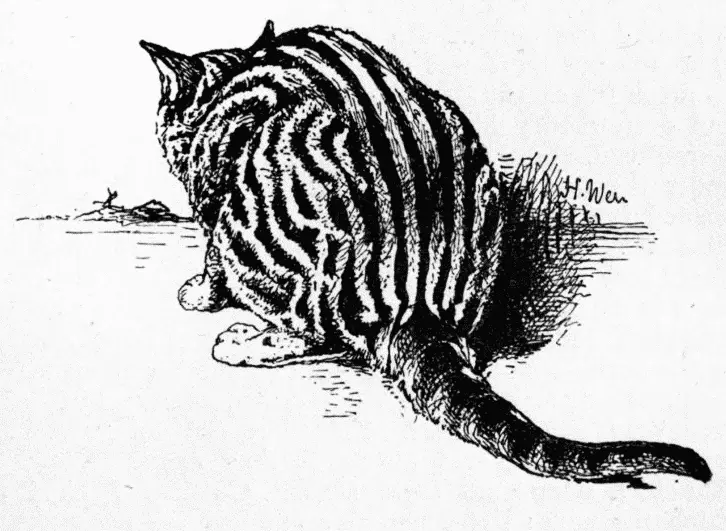Harrison Weir - Our Cats and All About Them
Здесь есть возможность читать онлайн «Harrison Weir - Our Cats and All About Them» — ознакомительный отрывок электронной книги совершенно бесплатно, а после прочтения отрывка купить полную версию. В некоторых случаях можно слушать аудио, скачать через торрент в формате fb2 и присутствует краткое содержание. Жанр: foreign_antique, Биология, Биология, Домашние животные, foreign_edu, на английском языке. Описание произведения, (предисловие) а так же отзывы посетителей доступны на портале библиотеки ЛибКат.
- Название:Our Cats and All About Them
- Автор:
- Жанр:
- Год:неизвестен
- ISBN:нет данных
- Рейтинг книги:4 / 5. Голосов: 1
-
Избранное:Добавить в избранное
- Отзывы:
-
Ваша оценка:
- 80
- 1
- 2
- 3
- 4
- 5
Our Cats and All About Them: краткое содержание, описание и аннотация
Предлагаем к чтению аннотацию, описание, краткое содержание или предисловие (зависит от того, что написал сам автор книги «Our Cats and All About Them»). Если вы не нашли необходимую информацию о книге — напишите в комментариях, мы постараемся отыскать её.
Our Cats and All About Them — читать онлайн ознакомительный отрывок
Ниже представлен текст книги, разбитый по страницам. Система сохранения места последней прочитанной страницы, позволяет с удобством читать онлайн бесплатно книгу «Our Cats and All About Them», без необходимости каждый раз заново искать на чём Вы остановились. Поставьте закладку, и сможете в любой момент перейти на страницу, на которой закончили чтение.
Интервал:
Закладка:
Most cats are of a gentle disposition, but resent ill-treatment in a most determined way, generally making use of their claws, at the same time giving vent to their feelings by a low growl and spitting furiously. Under such conditions it is best to leave off that which has appeared to irritate them. Dogs generally bite when they lose their temper, but a cat seldom. Should a cat dig her claws into your hand, never draw it backward, but push forward; you thus close the foot and render the claws harmless. If otherwise, you generally lose three to four pieces of skin from your hand; the cat knows he has done it, and feels revenged. Some cats do not like their ears touched, others their backs, others their tails. I have one now (Fritz); he has such a great dislike to having his tail touched that if we only point to it and say "Tail!" he growls, and if repeated he will get up and go out of the room, even though he was enjoying the comfort of his basket before a good fire. By avoiding anything that is known to tease an animal, no matter what, it will be found that is the true way, combined with gentle treatment and oft caressing, to tame and to make them love you, even those whose temper is none of the best. This is equally applicable to horses, cows, and dogs as to cats. Gentleness and kindness will work wonders with animals, and, I take it, is not lost on human beings.
The distance cats will travel to find and regain the home they have been taken from is surprising. One my groom begged of me, as he said he had no cat at home, and he was fond of "the dear thing," but he really wanted to be rid of it, as I found afterwards. He took the poor animal away in a hamper, and after carrying it some three miles through London streets, threw it into the Surrey Canal. That cat was sitting wet and dirty outside the stable when he came in the morning, and went in joyfully on his opening the door, ran up to and climbed on to the back of its favourite, the horse, who neighed a "welcome home." The man left that week.
Another instance, and I could give many more, but this will suffice. It is said that if you wish an old cat to stay you should have the mother with the kitten or kittens, but this sometimes fails to keep her. Having a fancy for a beautiful brown tabby, I purchased her and kitten from a cottager living two miles and a half away. The next day I let her out, keeping the kitten in a basket before the fire. In half an hour mother and child were gone, and though she had to carry her little one through woods, hedgerows, across grass and arable fields, she arrived home with her young charge quite safely the following day, though evidently very tired, wet, and hungry. After two days she was brought back, and being well fed and carefully tended, she roamed no more.
The cat, like many other animals, will often form singular attachments. One would sit in my horse's manger and purr and rub against his nose, which undoubtedly the horse enjoyed, for he would frequently turn his head purposely to be so treated. One went as consort with a Dorking cock; another took a great liking to my collie, Rover; another loved Lina, the cow; while another would cosset up close to a sitting hen, and allowed the fresh-hatched chickens to seek warmth by creeping under her. Again, they will rear other animals such as rats, rabbits, squirrels, puppies, hedgehogs; and, when motherly inclined, will take to almost anything, even to a young pigeon.
At the Brighton Show of 1886 there were two cats, both reared by dogs, the foster-mother and her bantling showing evident signs of sincere affection.
There are both men and women who have a decided antipathy to cats—"Won't have one in the house on any account." They are called "deceitful," and some go as far as to say "treacherous," but how and in what way I cannot discover. Others, on the contrary, love cats beyond all other "things domestic." Of course cats, like other animals, or even human beings, are very dissimilar, no two being precisely alike in disposition, any more than are to be found two forms so closely resembling as not to be distinguished one from the other. To some a cat is a cat, and if all were black all would be alike. But this would not be so in reality, as those well know who are close observers of animal and bird life. Of course the gamekeeper has a dislike to cats, more especially when they "take to the woods," but so long as they are fed, and keep within bounds, they are "useful" in scaring away rats from the young broods of pheasants. What are termed "poaching cats" are clearly "outlaws," and must be treated as such.
TRAINED CATS
That cats may be trained to respect the lives of other animals, and also birds on which they habitually feed, is a well-known fact. In proof of this I well recollect a story that my father used to tell of "a happy family" that was shown many years ago on the Surrey side of Waterloo Bridge. Their abode consisted of a large wire cage placed on wheels. In windy weather the "breezy side" was protected by green baize, so draughts were prevented, and a degree of comfort obtained. As there was no charge for "the show," a box was placed in front with an opening for the purpose of admitting any donations from those who felt inclined to give. On it was written "The Happy Family—their money-box." The family varied somewhat, as casualties occurred occasionally by death from natural causes or sales. Usually, there was a Monkey, an Owl, some Guinea-pigs, Squirrels, small birds, Starlings, a Magpie, Rats, Mice, and a Cat or two. But the story? Well, the story is this. One day, when my father was looking at "the happy family," a burly-looking man came up, and, after a while, said to the man who owned the show: "Ah! I don't see much in that. It is true the cat does not touch the small birds [one of which was sitting on the head of the cat at the time], nor the other things; but you could not manage to keep rats and mice in there as well." "Think not?" said the showman. "I think I could very easily." "Not you," said the burly one. "I will give you a month to do it in, if you like, and a shilling in the bargain if you succeed. I shall be this way again soon." "Thank you, sir," said the man. "Don't go yet," then, putting a stick through the bars of the cage he lifted up the cat, when from beneath her out ran a white rat and three white mice. "Won—der—ful!" slowly ejaculated he of the burly form; "Wonder—ful!" The money was paid.
Cats, properly trained, will not touch anything, alive or dead, on the premises to which they are attached. I have known them to sport with tame rabbits, to romp and jump in frolicsome mood this way, then that, which both seemed greatly to enjoy, yet they would bring home wild rabbits they had killed, and not touch my little chickens or ducklings.

"The Old Lady"
When I built a house in the country, fond as I am of cats, I determined not to keep any there, because they would destroy the birds' nests and drive my feathered friends away, and I liked to watch and feed these from the windows. Things went pleasantly for awhile. The birds were fed, and paid for their keep with many and many a song. There were the old ones and there the young, and oft by the hour I watched them from the window; and they became so tame as scarcely caring to get out of my way when I went outside with more food. But—there is always a but—but one day, or rather evening, as I was "looking on," a rat came out from the rocks, and then another. Soon they began their repast on the remains of the birds' food. Then in the twilight came mice, the short-tailed and the long, scampering hither and thither. This, too, was amusing. In the autumn I bought some filberts, and put them into a closet upstairs, went to London, returned, and thought I would sleep in the room adjoining the closet. No such thing. As soon as the light was out there was a sound of gnawing—curb—curb—sweek!—squeak—a rushing of tiny feet here, there, and everywhere; thump, bump—scriggle, scraggle—squeak—overhead, above the ceiling, behind the skirting boards, under the floor, and—in the closet. I lighted a candle, opened the door, and looked into the repository for my filberts. What a hustling, what a scuffling, what a scrambling. There they were, mice in numbers; they "made for" some holes in the corners of the cupboard, got jammed, squeaked, struggled, squabbled, pushed, their tails making circles; push—push—squeak!—more jostling, another effort or two—squeak—squeak—gurgle—squeak—more struggling—and they were gone. Gone? Yes! but not for long. As soon as the light was out back they came. No! oh, dear no! sleep! no more sleep. Outside, I liked to watch the mice; but when they climbed the ivy and got inside, the pleasure entirely ceased. Nor was this all; they got into the vineries and spoilt the grapes, and the rats killed the young ducks and chickens, and undermined the building also, besides storing quantities of grain and other things under the floor. The result number one was, three cats coming on a visit. Farmyard cats—cats that knew the difference between chickens, ducklings, mice, and rats. Result number two, that after being away a couple of weeks, I went again to my cottage, and I slept undisturbed in the room late the play-ground of the mice. My chickens and ducklings were safe, and soon the cats allowed the birds to be fed in front of the window, though I could not break them of destroying many of the nests. I never noticed more fully the very great use the domestic cat is to man than on that occasion. All day my cats were indoors, dozy, sociable, and contented. At night they were on guard outside, and doubtless saved me the lives of dozens of my "young things." One afternoon I saw one of my cats coming towards me with apparent difficulty in walking. On its near approach I found it was carrying a large rat, which appeared dead. Coming nearer, the cat put down the rat. Presently I saw it move, then it suddenly got up and ran off. The cat caught it again. Again it feigned death, again got up and ran off, and was once more caught. It laid quite still, when, perceiving the cat had turned away, it got up, apparently quite uninjured, and ran in another direction, and I and the cat—lost it! I was not sorry. This rat deserved his liberty. Whether it was permanent I know not, as "Little-john," the cat, remained, and I left.
Читать дальшеИнтервал:
Закладка:
Похожие книги на «Our Cats and All About Them»
Представляем Вашему вниманию похожие книги на «Our Cats and All About Them» списком для выбора. Мы отобрали схожую по названию и смыслу литературу в надежде предоставить читателям больше вариантов отыскать новые, интересные, ещё непрочитанные произведения.
Обсуждение, отзывы о книге «Our Cats and All About Them» и просто собственные мнения читателей. Оставьте ваши комментарии, напишите, что Вы думаете о произведении, его смысле или главных героях. Укажите что конкретно понравилось, а что нет, и почему Вы так считаете.












